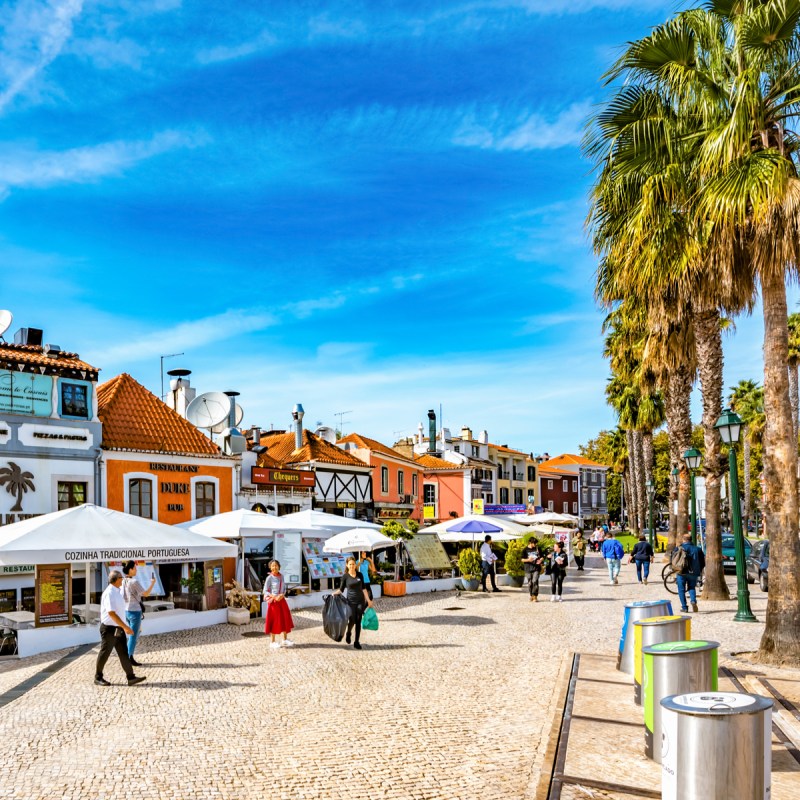
When we decided to move from the United States to Portugal, we did a ton of research. We wanted to be sure we left no stone unturned when it came to what we could expect from our new life abroad. Even though we had both visited our new home country several times and talked with experts and locals alike, there were still some unexpected trials and triumphs. Here are seven things we wish we knew before moving abroad that would have made the experience even better.
Videos by TravelAwaits

1. Everything Takes Longer Than Expected, Except When It Doesn’t
Before moving abroad, we learned that countries such as Portugal are thick with bureaucracy. There is a lot of paperwork, and procedures must be followed perfectly or there will be delays. When we applied for our visas, we were told it would take at least 2 months before we were approved, and longer if anything was amiss. So we were surprised when we received our approvals within 1 month of submission. The same goes for daily life activities. Trying to change an address can take months and is different with each place you need to change it. And while we received our permanent residence cards in a matter of days, we are still working on exchanging our drivers licenses, which may take up to a year. Packages often list delivery times but are delivered days before, which can be challenging because, in Portugal, you have to be home to personally receive your deliveries.
2. No Doesn’t Always Mean No
One thing that we knew we would have to pack when we moved to Portugal was our patience. But what we didn’t know was that part of the culture seems to be that every first answer to a request is no. When we moved into our first apartment, it was a temporary spot for just a few months. But the management company knew that we would be mailed important documents like bank cards, insurance policies, and residency papers at this address. When we asked for a key to the mailbox, we were told that they never give the key to tenants. We explained why we needed the key and then were still told no. The next day, a person came to deliver us the mailbox key. This is a process we have seen repeated over and over with services, processes, deliveries, repairs, and other everyday activities. In Portugal, we don’t just take no for an answer because no doesn’t always mean no.

3. Some Items Are Really Hard Or Expensive To Get
Coming from the United States, where just about anything you want is available at a nearby store or with the click of a mouse, things can be quite different in a country like Portugal. Of course, we knew about this generally, and even some of the specifics from our research. We knew to bring plenty of over-the-counter vitamins and pain relievers, and that large size shoes were hard to find. Certain foods are just not in the Portuguese diet so we expected to make accommodations or go without. But we were surprised to find that certain items that we considered to be quite common are actually not in Portugal. To get them we needed to search through many different sources or be willing to pay quite a premium. Diana loves to bake at Christmas and since the holiday is a big deal in Portugal, we thought it would be easy to find some “standard” holiday baking items like chocolate chips, red and green sugars, or candy canes. Wrong. While chocolate “pepitas” are available, they come in quite small and expensive packages so that several would be required to make a single batch of chocolate chip cookies. We eventually found candy canes at a British import store. And colored sugars were only available from a specialized baking resource. The same can be said for some non-holiday items, forcing us to order online from another European country, get creative with substitutes, or try new approaches.

4. It’s Easier To Develop A Social Circle Than We Thought
We did our best to meet people online through Facebook groups and through friends of friends before we moved abroad. We kept ourselves open to friendships with a broad range of people. And we felt as though we had people we could communicate with even before we arrived. Even so, there’s a certain anxiousness we had about being able to develop a true social circle once we had settled in and were ready to meet people in person. We wish we had known that this was one worry we didn’t need to have. The people we met online were just as friendly and active offline. Within our first month, we had regular picnic lunches, weekly walks, Friday happy hours, and a whole range of meals, parties, hikes, shopping trips, and events to enjoy. As we’ve extended our hands in friendship to others, our social circle has expanded too.

5. People Want To Help
Anyone who has moved knows the continuing stream of details that need attention. Turning on utilities, getting Internet service, buying appliances, furniture, lighting, and everything else takes time and money. While there is a lot to be done, it is a lot less stressful when there are people who want to help you get through it. We found that the people in Portugal tasked with things like turning on our electricity, testing the safety of our natural gas connection, and getting our water flowing all wanted to help and make it as painless as possible. Sometimes they spoke enough English that we could understand one another, other times, not so much. But even when language is a barrier, smiles and pointing and thumbs up signals go a long way. It’s easy to be anxious when dealing with all these chores that are important to get done quickly and correctly. Knowing that the people doing them are trying to make it easier for you can relieve a lot of the stress.

6. Local Culture And Customs About Time Affects Everyday Living
We admit that we came from a 24/7 lifestyle in a country where closing times are not much of an issue. When we moved to Portugal, we realized that time is an important consideration in everyday life. First, there are many holidays when just about everything closes. Not just banks and schools. Everything. Then there is the fact that most restaurants have a distinct closing time mid-afternoon, generally between 3 p.m. and 6:30–7 p.m., where they take a break and serve no meals. And most restaurants close 1 day a week, though that day is up to them. Shops, banks, service providers, and vendors observe a lunch break mostly between 1 p.m. and 3 p.m., so if you planned on getting something done during your lunch hour, you can probably forget about that. It’s really just an inconvenience until incorporating these time considerations into daily life.

7. We Wish We Knew We Would Adapt So Quickly To Our New Home And Life
It’s true we have spent a significant amount of our adult life traveling and experiencing different cultures. But that’s not the same thing as uprooting your life and living in another country. Like anyone making such a big shift, we had concerns about the move and how we would adapt to our new home and life. We prepared ourselves for a bit of homesickness, loneliness, and feelings of being different or even unwanted. To our surprise, we have been happy that our transition has been quicker and easier than we ever expected. Some of that is due to our extensive preparation. Part of it is due to the friends we have made. But we also owe a lot to the people of our adoptive country. The Portuguese have earned a reputation for welcoming foreigners and treating one another with kindness. These traits have not only made us feel as though we have chosen the right place to be, but that it is a place we will be happy to call home for many years to come.
Moving abroad is a big adventure. Even though we did our homework, there were still some things we wish we knew before moving abroad. While some of those things require personal adjustments, others are happy surprises that have helped smooth our transition to living in a new country.
